Indus Water Treaty
Re: Indus Water Treaty
A few well placed landslides can do the work...then during monsoon we can clear the landslides.
Re: Indus Water Treaty
Thanks Sridhar and Amber for your insights, appreciate it!
https://www.tunnel-online.info/en/artik ... 73103.html
As per the link above, Nepal has some 12 river diversion projects and this one for the Sunkoshi Marin diversion project was a tunnel 13 km in length was completed at least 11 months ahead of schedule. The project executor is a Chinese consortium. The geological understanding of Himalayan lesser ranges appears to have improved considerably since the KHEP was completed. I have given the url for some of the other projects below. They are very good detailed material.
https://www.robbinstbm.com/wp-content/u ... st-TBM.pdf
https://www.mdpi.com/2673-7094/2/4/39
Common to these projects is they are all undertaken in the Siwalik Hills where we have the greatest chance of success with Chenab. Also, the TBM used is from a company called Robbins and they have reported an average of 1.2 km per month and have often achieved 1.5 km per month in these ranges. These tunnels are built keeping in mind safety from earthquake related incidents.
If we use the above logic, one could complete diversion tunnels from Chenab at Baglihar to Ranjit Sagar in about 5.5 years approx over the 80 km distance. They can be used to generate hydro power as well. Similar diversion tunnels can be built at Ratle and Salal as well.
The material above states that the flow of water designed is 67 cubic meter per second. If my calculations are correct one such diversion tunnel can transfer upto 2 MAF annually. Chenab is at least 22-24 MAF annually. There is another of these projects listed above, the Bheri Bhabai was designed for 40 cubic meter per second. With a higher gradient, we can increase the rate of water flow and power generation capacity as well and a diversion tunnel may as well transfer more than 2 MAF yearly.
They can be critical during the dry season and also help in putting a leash on Pakistan.
https://www.tunnel-online.info/en/artik ... 73103.html
As per the link above, Nepal has some 12 river diversion projects and this one for the Sunkoshi Marin diversion project was a tunnel 13 km in length was completed at least 11 months ahead of schedule. The project executor is a Chinese consortium. The geological understanding of Himalayan lesser ranges appears to have improved considerably since the KHEP was completed. I have given the url for some of the other projects below. They are very good detailed material.
https://www.robbinstbm.com/wp-content/u ... st-TBM.pdf
https://www.mdpi.com/2673-7094/2/4/39
Common to these projects is they are all undertaken in the Siwalik Hills where we have the greatest chance of success with Chenab. Also, the TBM used is from a company called Robbins and they have reported an average of 1.2 km per month and have often achieved 1.5 km per month in these ranges. These tunnels are built keeping in mind safety from earthquake related incidents.
If we use the above logic, one could complete diversion tunnels from Chenab at Baglihar to Ranjit Sagar in about 5.5 years approx over the 80 km distance. They can be used to generate hydro power as well. Similar diversion tunnels can be built at Ratle and Salal as well.
The material above states that the flow of water designed is 67 cubic meter per second. If my calculations are correct one such diversion tunnel can transfer upto 2 MAF annually. Chenab is at least 22-24 MAF annually. There is another of these projects listed above, the Bheri Bhabai was designed for 40 cubic meter per second. With a higher gradient, we can increase the rate of water flow and power generation capacity as well and a diversion tunnel may as well transfer more than 2 MAF yearly.
They can be critical during the dry season and also help in putting a leash on Pakistan.
Re: Indus Water Treaty
I was looking up the Kishenganga project and I was struck by an idea: since the Kishenganga water is diverted into Jhelum and to Wular lake, can't you just increase the capacity of the Wular lake ? Like take up desilting etc.
And some Google searches later, I found that someone has already written a very detailed article about this:How Is the Indus Water Treaty India’s Greatest Untapped Weapon?
And some Google searches later, I found that someone has already written a very detailed article about this:How Is the Indus Water Treaty India’s Greatest Untapped Weapon?
Code: Select all
Shrunken Lakes in Kashmir That Can Be Replenished by Rivers of the Indus System
Lake Name Location Shrinkage Status Nearby Indus Tributary Replenishment Feasibility Estimated Time for Replenishment Remarks
Wular Lake Bandipora District Shrunk by 45% since 1900 Jhelum River Very High 5–7 years Needs de-siltation + canal diversion work.
Dal Lake Srinagar Shrunk by 25–30% Jhelum River (via small channels) Moderate 7–10 years Needs urban sewage control first.
Anchar Lake Srinagar outskirts Nearly dried, now swampy Jhelum River Moderate to High 5–6 years Needs heavy decontamination.
Gilsar Lake Srinagar City Connected via channels Jhelum River Moderate 4–5 years Must restore channel connectivity.
Khushal Sar Srinagar Severely degraded Jhelum River Moderate 4–6 years Combined restoration with Gilsar needed.
Hokersar Wetland Srinagar outskirts Highly shrunk Doodhganga Nallah (tributary of Jhelum) High 3–4 years Needs seasonal water supply restoration.
Shalbugh Wetland Ganderbal District 70% reduced Sindh Stream (feeds into Jhelum) High 3–5 years Bird migratory hub – urgent restoration needed.
Nageen Lake Srinagar Minor shrinkage Jhelum River High 2–3 years Linked naturally with Dal Lake; easier.
- Wular and Hokersar are the top priorities because they act as natural flood sponges for Kashmir Valley.
- Dal and Anchar Lakes need sewage control simultaneously, otherwise river-fed replenishment will worsen pollution.
- Channel Restoration is critical – reconnecting ancient waterways (like Nallah Amir Khan, Mar Canal) is necessary to allow river water to reach these lakes naturally.
- Eco-engineering Solutions (like artificial wetlands at entry points) should be used to filter the river water before entering these fragile lakes.
Imagine a Kashmir where its rivers run fuller, its lakes breathe deeper, and the Valley reclaims its title as the “Emerald of the Himalayas.” If Indus waters are harnessed intelligently – not aggressively, but lovingly – a quiet transformation could unfold. Wular could once again stretch its arms wide, cradling bird migrations from distant lands. Dal could regain its crystal clarity, where the mirrored reflection of the Zabarwan hills would seem like another world beneath. Houseboats could sail across waters, no longer battling weeds and silt but gliding as they once did, years ago.
The nutrient-rich soil of Kashmir would sip from these veins of life, thriving with renewed abundance. Hokersar, Shalbugh, and Anchar wetlands would become breathing lungs, safeguarding the Valley against floods and droughts.
Re: Indus Water Treaty
Pakistan has a very level of irrigation water use for its farming. A lion's share of Indus water is used for that purpose. In some dry years the usage is so extreme that Indus water does not reach sea.
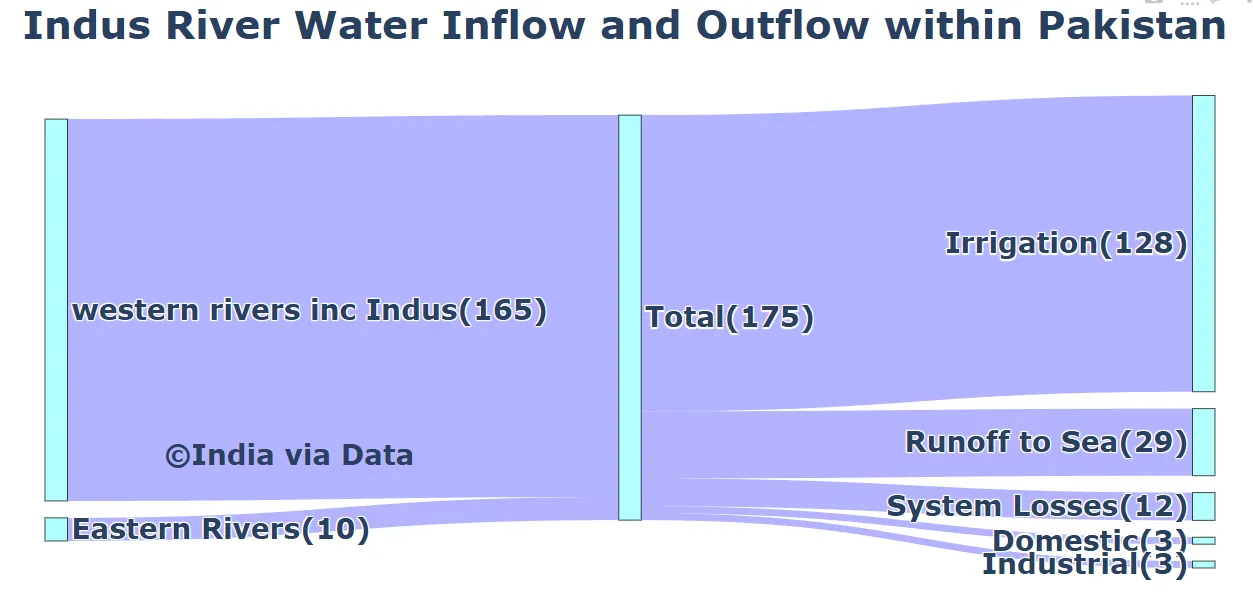
What is interesting is that majority of the Indus water comes from snow-melt, most of which happens in Indian territory. The contribution from rainfall is nowhere going to meet their needs. We can proverbially turn off the tap on this fake country
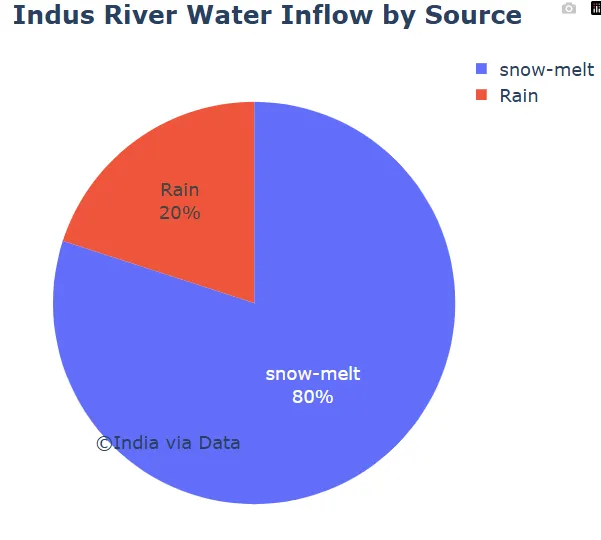
Now, you'd think that Pakistan would try to use its limited water resources judiciously. No, they overdraw from the environment, and stand together with Middle eastern desert countries in water scarcity.
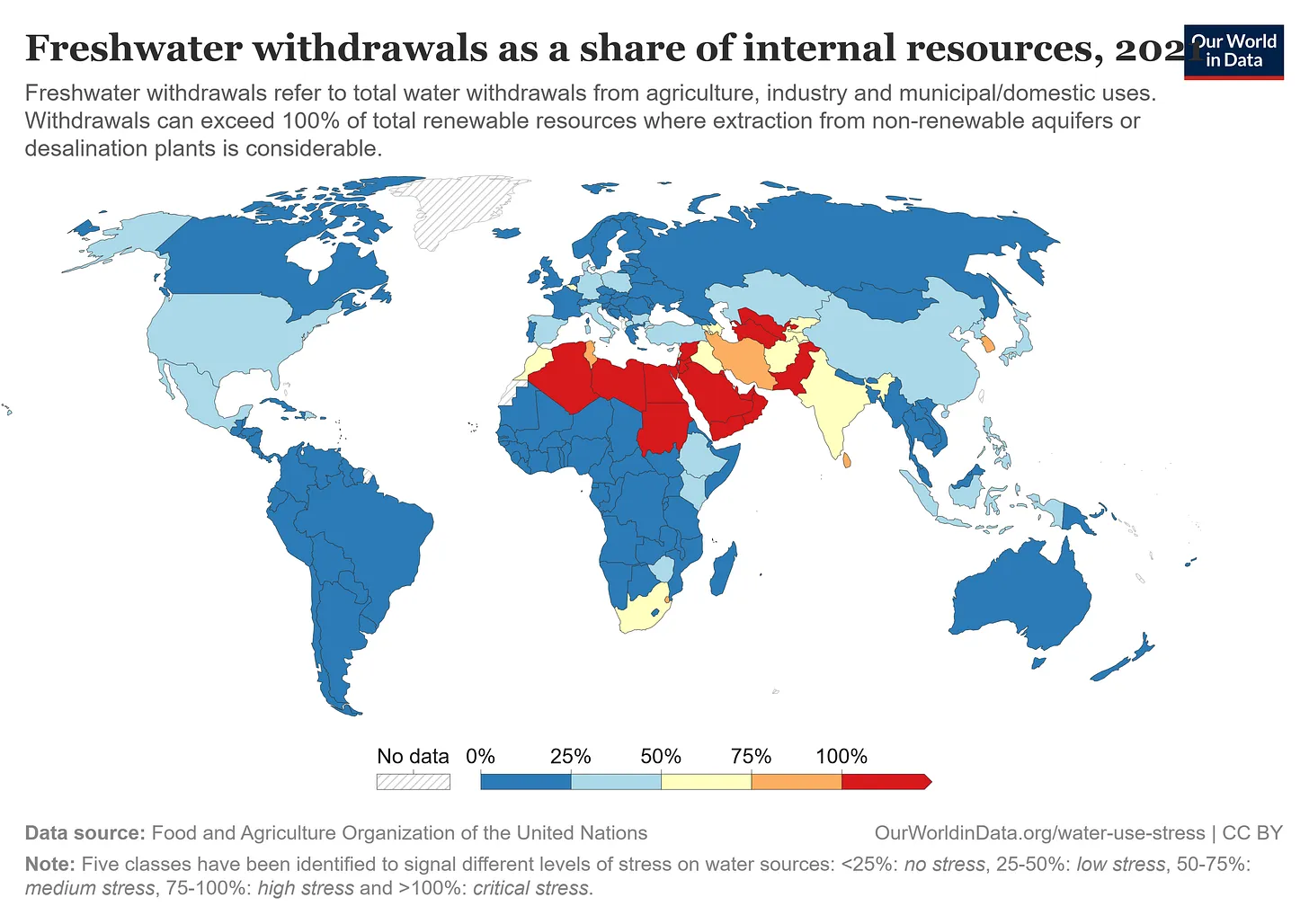
Further, they have not invested in their rainwater harvesting and water conservation infrastructure. The last time they built anything was in 1960s with the money we gave them for Indus Basin Fund. If we go ahead and reduce water flows by a handful of percent points this year, and more every year as we build new infra, they'd feel the pain. They would also have no alternative because they are already using more water than is available.
Source: https://indiaviadata.substack.com/p/the ... rough-data

What is interesting is that majority of the Indus water comes from snow-melt, most of which happens in Indian territory. The contribution from rainfall is nowhere going to meet their needs. We can proverbially turn off the tap on this fake country

Now, you'd think that Pakistan would try to use its limited water resources judiciously. No, they overdraw from the environment, and stand together with Middle eastern desert countries in water scarcity.

Further, they have not invested in their rainwater harvesting and water conservation infrastructure. The last time they built anything was in 1960s with the money we gave them for Indus Basin Fund. If we go ahead and reduce water flows by a handful of percent points this year, and more every year as we build new infra, they'd feel the pain. They would also have no alternative because they are already using more water than is available.
Source: https://indiaviadata.substack.com/p/the ... rough-data
Re: Indus Water Treaty
#IWT is already being weaponised.
Read the marked portions
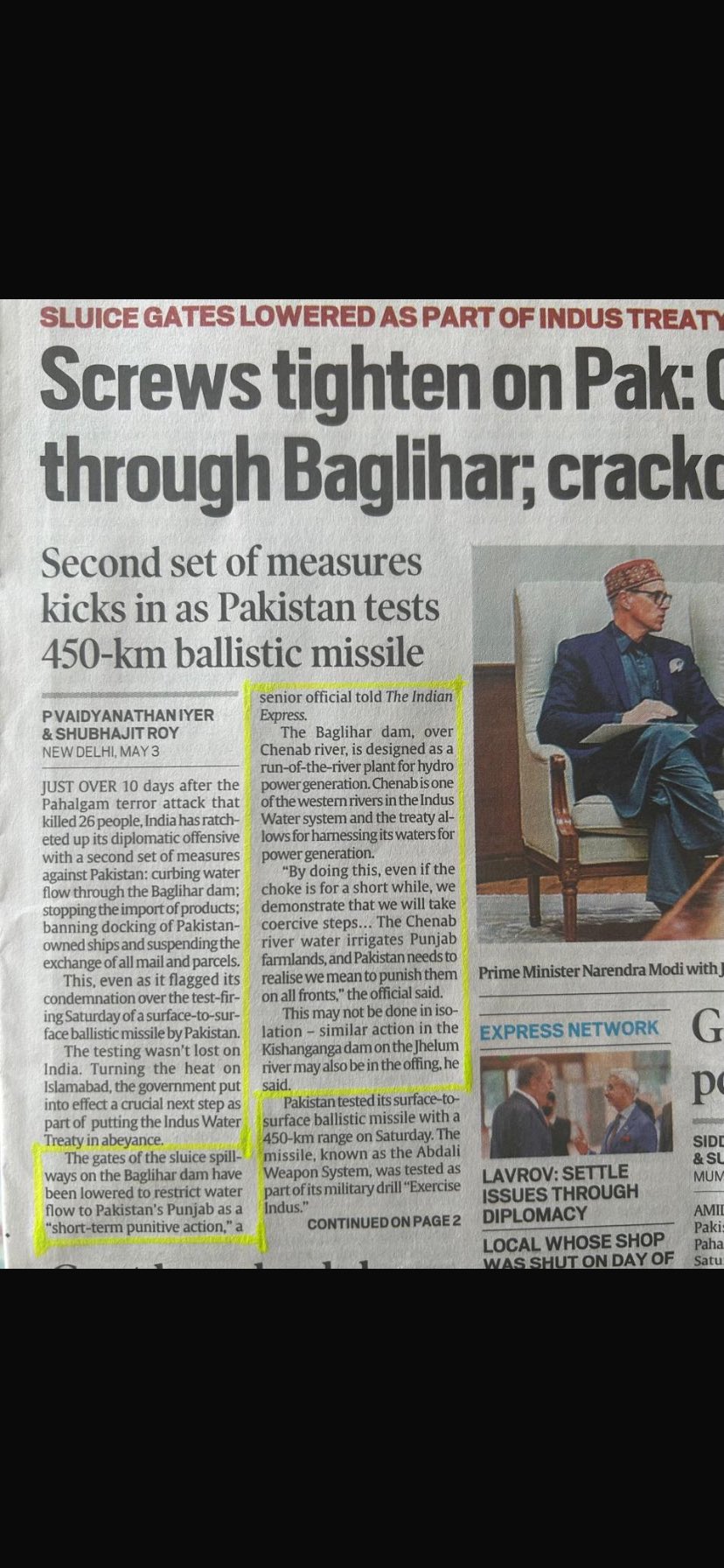
Re: Indus Water Treaty
The history after Partition but before the IWT talks started is very useful. It amply demonstrates Pakistani perfidy and our inconsistency and generosity. I quote from the SRR paper:
BTW, that amount is still outstanding !After the Partition, both the dominions agreed to a “Standstill Agreement” on Dec. 30, 1947 freezing the existing water turn systems at the two headworks of Madhopur (on the Ravi) and Ferozepur (on the Sutlej) until March, 31, 1948. Any dispute that could not be resolved by the Punjab Partition Committee was to be decided by the Arbitral Tribunal (AT) which had been setup under Section Nine of the Indian Independence Act by the Governor General to sort out difficulties arising over the division of assets. However, on the expiry of the arrangement and after not receiving an encouraging response to a reminder for talks issued by the East Punjab Government on 29th March 1948, and in the absence of a new agreement, the then Indian Punjab Government promptly stopped the water supply through Madhopur on April, 1, 1948. By a coincidence, the Arbitral Tribunal’s term also expired on the same day. In the meanwhile, the AT had accepted India’s claims regarding seigniorage charges for the waters and ordered payment of the same by Pakistan. At the invitation of East Punjab, the Engineers of the two divided-Punjab States met in Simla on Apr. 15, 1948 and signed two Standstill Agreements [5] regarding the Depalpur Canal and Central Bari Doab Canal to be in effect until Oct. 15, 1948. The West Punjab Government agreed to pay: (1) seigniorage charges, (2) proportionate maintenance costs, and (3) interest on a proportionate amount of capital. In its defence, the GoI cited such charges levied by the Punjab on the Bikaner state under the British.
{So far so good with justifiable Indian action. But, our self-goal started soon therefater as detailed below}
However, the West Punjab Govt. later refused to ratify this Agreement and the Prime Minister of Pakistan, Liaqat Ali Khan called for a meeting. The Finance Minister of Pakistan, Ghulam Mohammed along with the Pakistani Punjab ministers, Shaukat Hayat Khan and Mumtaz Daulatana visited Delhi and worked out an agreement [4] in the Inter-Dominion Conference held on May, 3-4, 1948. While agreeing to resume release of water from the headworks, India made it clear that Pakistan could not lay claim to these waters as a matter of right and levied seigniorage charges as specified by the Prime Minister of India to be deposited in Reserve Bank of India, which established the sovereignty of India over these rivers. The Indian side also assured that the waters would be diminished slowly giving enough time for Pakistan to develop alternate sources. The West Punjab Government, for its part, also recognized “the natural anxiety of the East Punjab Government to discharge the obligations to develop areas where water is scarce and which were underdeveloped in relation to parts of West Punjab”. Very soon, the Pakistani Government falsely charged that they were compelled to sign this Agreement and also appealed to the Governor General Lord Mountbatten in futility. However, due to the hostilities between India and Pakistan on account of Kashmir and in the general environment of distrust and animosity, no further talks took place. Pakistan’s suggestion in June, 1949 to take the matter to the International Court of Justice at The Hague and widen the conflict across all rivers, was rejected by India. On Nov. 1, 1949, Pakistan unilaterally invalidated the Delhi Agreement and by July, 1950 stopped seigniorage payments into RBI. However, India continued to abide by the Agreement and supplied waters.
Re: Indus Water Treaty
That is truly long history.
Don't envy the government's job one bit. The muck in the stables is neck deep.
Don't envy the government's job one bit. The muck in the stables is neck deep.
Re: Indus Water Treaty
vera_k ji,
the SOBs had ghundy, neverwho, britshits and amrikis, UN and the WB batting for them.
they now have the congis, and the commies, and the Indian jihadis + (britshits and amrikis), UN and the WB, who are still batting for them after all these years
do you think that so many pakis would have settled in India in the past several decades without the congis and the commies being aware of it, or how the jihadis waqfed the Hindus so openly
The nationalists are naive and can still be deceived so very easily by any tom, (p)rick, or harry
Re: Indus Water Treaty
From ToIMeanwhile, locals in the area expressed their support for Prime Minister Narendra Modi's decision to put the Indus Waters Treaty on hold, which they believe has led to a decrease in water levels.
Speaking to ANI, one of the locals exhorted that they don't want even a single drop of water to be supplied to Pakistan while extending support to the Indian Army and Prime Minister Narendra Modi.
A local Kalyan Singh said, "Earlier, the Chenab River used to flow at a height of 25-30 feet, but now there is hardly 1.5-2 feet of water left here. This is because of PM Modi's decision to put the Indus Waters Treaty on hold...We do not want even a single drop of water to be supplied to Pakistan. We are all standing with the Indian Army and PM Modi..."
Another local expressed shock over the drastic change in the level of water in the river Chenab in the Akhnoor area of the territory.
"In my 75 years of life, for the first time I have seen such low volume of water in Chenab, I express gratitude to PM Modi for taking this decision. I'm shocked to witness the drastic change in the river's water level, from once being full to now barely having 1-1.5 feet of water .... We stand with Indian Army..." he said.
Re: Indus Water Treaty
good take on the impact
India has more or less walked out of the 65 year old Indus Waters Treaty following the horrific terrorist attack in Pahalgam last week. So far it has kept the implementation of the treaty in abeyance 'with immediate effect, until Pakistan credibly and irrevocably abjures its support for cross-border terrorism,' the Ministry of External Affairs said in an official statement.
In effect the treaty is as good as dead, says India's former High Commissioner to Pakistan, seasoned diplomat and strategic thinker, Ambassador Satish Chandra.
In this chat with Editor-in-Chief Nitin A. Gokhale, Ambassador Chandra explains why. He points out India has 40 per cent roughly of the catchment area of the Indus basin. But under the treaty, India is providing Pakistan as much as 80 per cent of the water, keeping only 20 per cent for us.
The second thing he thinks everyone needs to understand is that West Punjab (now in Pakistan) at the time of partition was heavily irrigated and had about 140 canals whereas East Punjab now in India) barely had 12 canals.
Another figure: As against about 21 million acres of land irrigated, India only had 5 million. So really for this treaty to have been fair India should have demanded that much more of the irrigation that was being created. But that did not happen.
Add to this the fact that India paid Pakistan as much as $175 million in 1961 over a ten year installment period.They got as much as $900 million in the Indus Basin Fund, which was provided by the international institutions by donor countries. The USA paid around $450 million. So we were the second largest. With that money, Pakistan built two big dams and several canals. With India's money!
Amb Chandra is therefore pleased that India has finally decided to bite the bullet and hit Pakistan where it hurts them in the medium and long term if not immediately. Listen in for an insight into a slice of history that is largely hidden from common citizens
Re: Indus Water Treaty
East Punjab had been classified as 'Crown Wasteland' under British revenue records.
Re: Indus Water Treaty
Indian presstitutes' smorgasbord on IWT
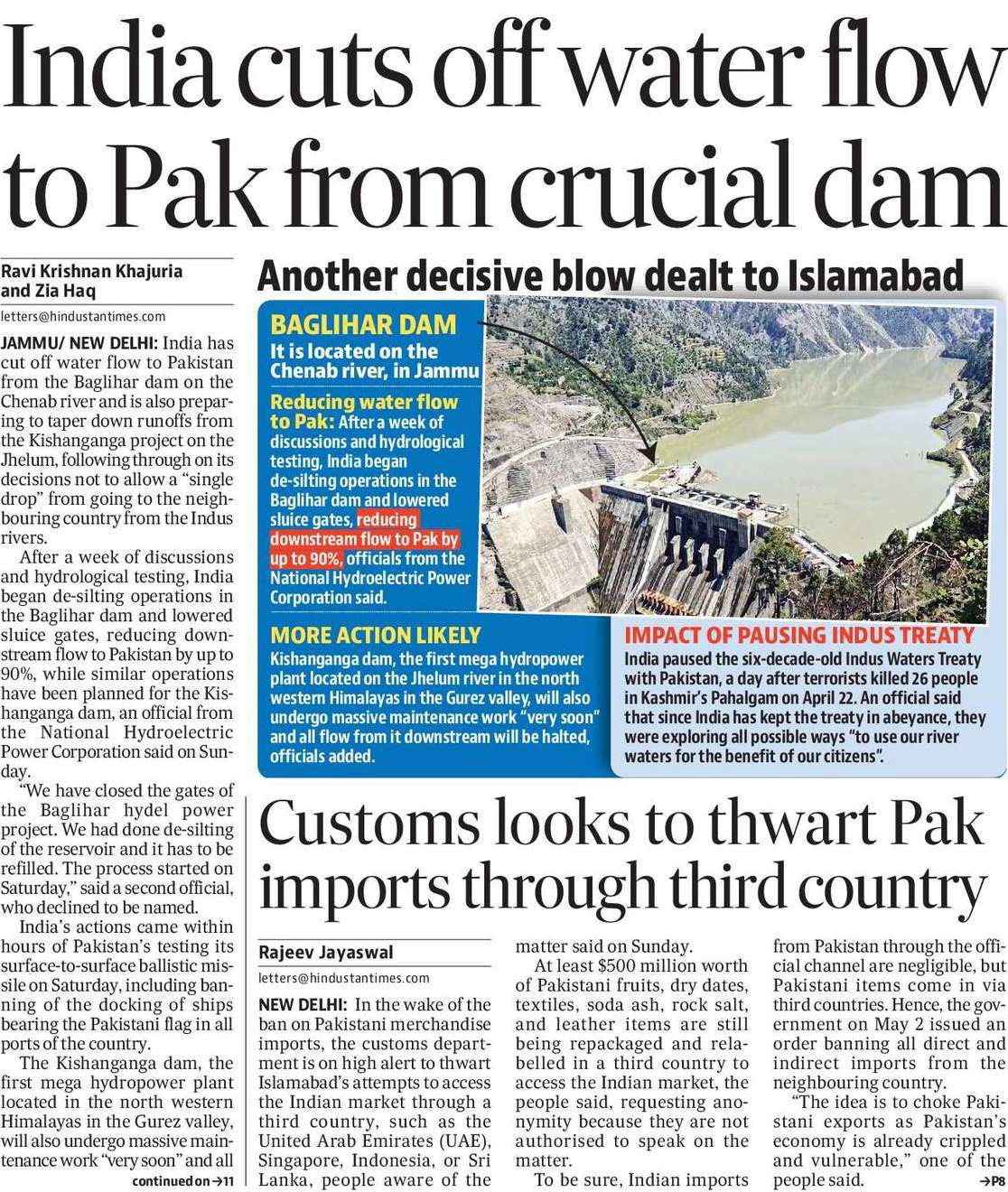
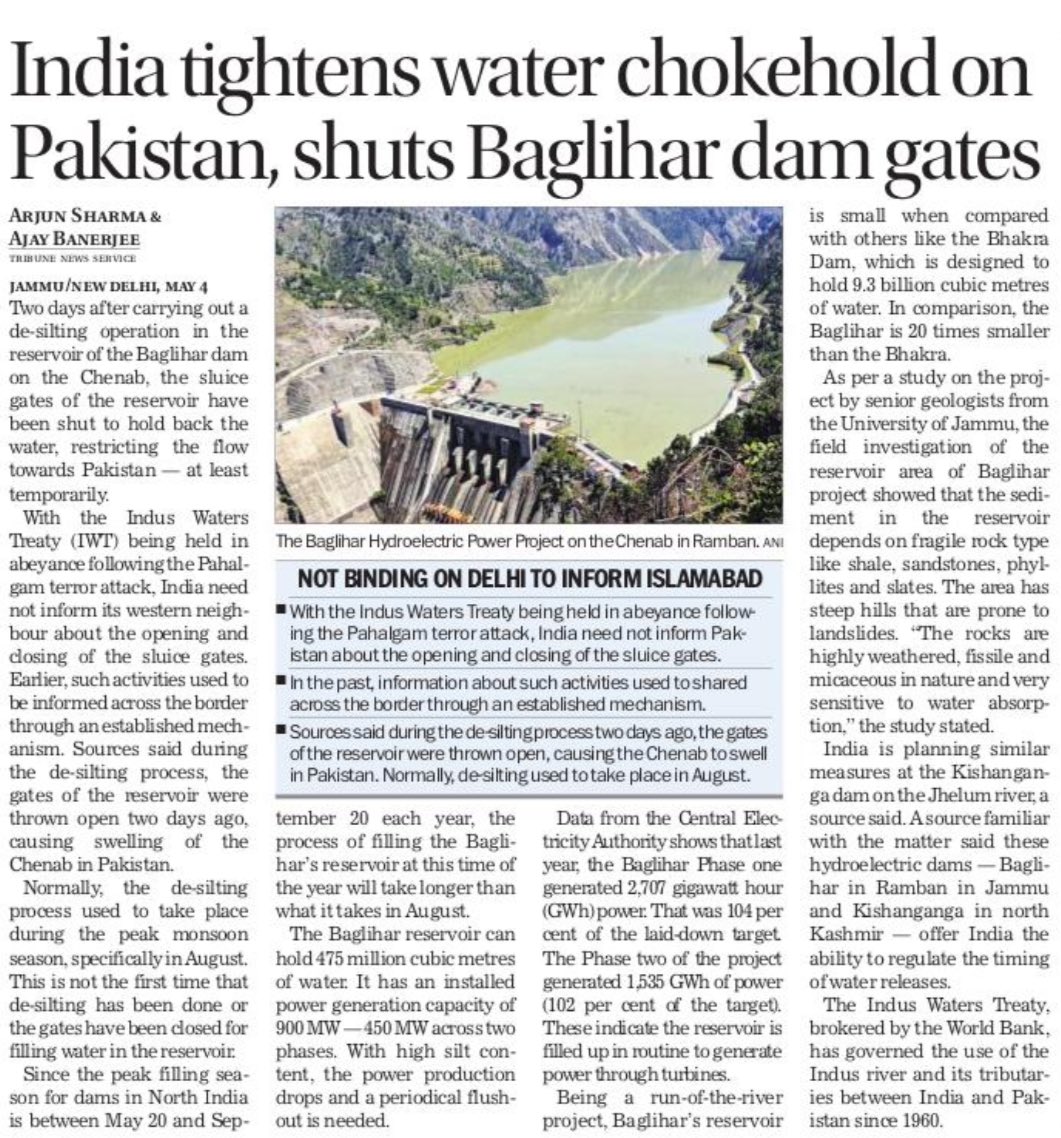
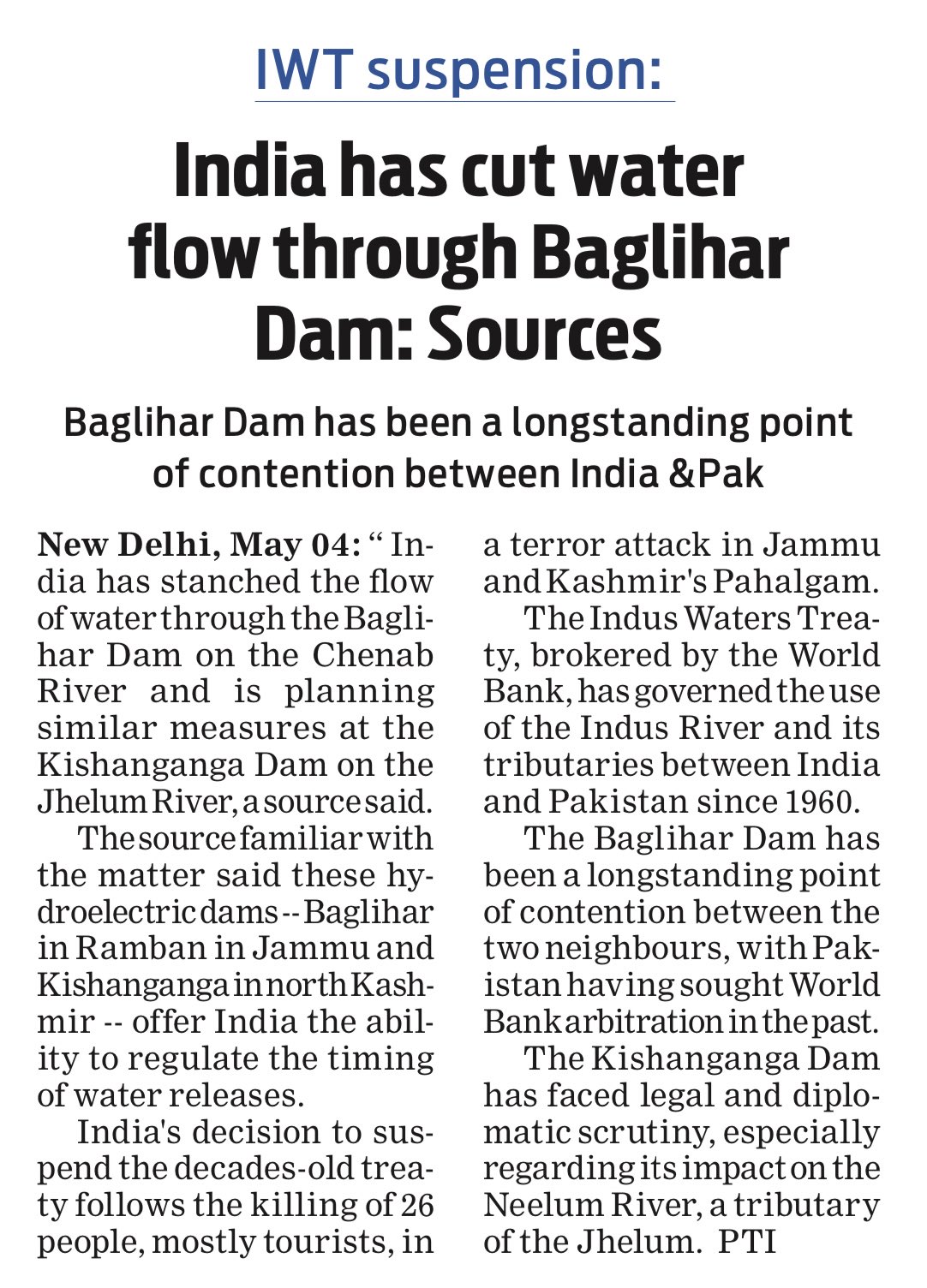
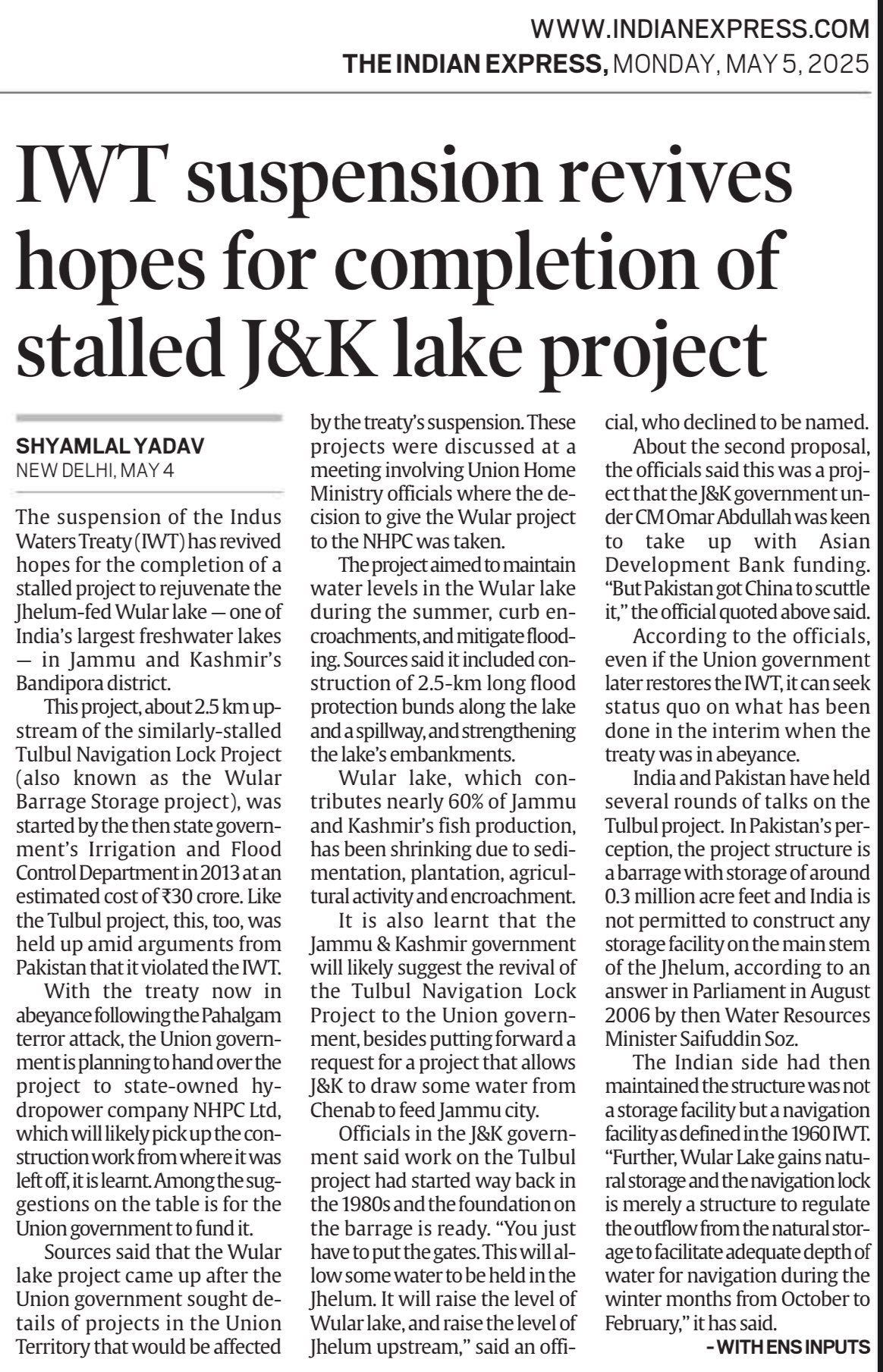




-
sanjaykumar
- BRF Oldie
- Posts: 6703
- Joined: 16 Oct 2005 05:51
Re: Indus Water Treaty
Crown wastelands in Ontario were and perhaps are still known as the Queen’s Bush.
Hahahahar and har.
Hahahahar and har.
Re: Indus Water Treaty
Sources said the authorities had closed all five main gates of Baglihar Dam and those of Salal Dam downstream. Water released from Baglihar typically flows to Salal before the Chenab rolls into Pakistan, where it serves as a critical lifeline for its Punjab province. By closing both dams, authorities effectively stopped the river’s flow.
Officials downplayed the moves, saying the dams’ gates were first opened to flush out silt and mud and then closed under a “continuous process”.In Jammu’s Akhnoor, dozens walked across the river, something they said they had never experienced before. Children collected coins from the bed as water levels dropped to 1.5-2ft from 25-30ft. “For the first time in my life today, I was able to walk across half the Chenab. It’s unbelievable,” an Akhnoor resident said on Monday.
According to Luv Puri, former UN counter-terrorism official and a Kashmir expert, the implications of placing IWT in abeyance are becoming increasingly evident. “It shows this was preceded by significant preparation,” Puri said.
Farooq Abdullah, former chief minister and president of J&K’s governing National Conference (NC), had on Saturday reiterated his party’s opposition to IWT. He argued that the 1960 treaty had harmed J&K’s interests and called for diverting Chenab’s waters to Jammu and harnessing Jhelum’s waters to generate power in Kashmir. NC has long claimed that the rights over the region’s rivers were given to Pakistan under IWT without consulting J&K. “We have been saying that this treaty has to be reviewed,” Abdullah said.
Re: Indus Water Treaty
The Tulbul Navigation Lock/Wullar Barrage Issue
The 74 Sq. Km. Wullar Lake (original size 202 Sq. Kms.) is the largest freshwater lake in India and is situated on the Jhelum and supplies 40% of J&K’s fish catch. The stretch of 22 Km between Sopore and Baramulla becomes non-navigable during the lean winter season with a water depth of only 2.5 ft. Small streams like the Harbuji, Arrah, Erin, Pohru and Bandipur flow into this lake. The Jhelum becomes shallow and sand banks appear in the river-bed obstructing navigation. It is only in spring that rainfall causes the snow to melt at higher elevations on the surrounding mountains and causes floods. [16]
In order to improve navigation, India started constructing in 1985, a barrage 439 feet long and with a lock, at the mouth of the lake to raise the flow of water in winter to 4000 cusecs with a depth of 4 ft with an added storage of 0.3 MAF. Pakistan objected to this project and construction was halted in 1987. Pakistan’s objection [17,18] stems from two issues, one India needs to get concurrence of the design from Pakistan and two, it cannot store waters as per IWT on the Jhelum Main anything in excess of 0.01 MAF as “incidental storage work” (Paragraph 8(h) in Annexure E of IWT).
In fact, this project was first proposed in 1912 by the then united Punjab Government to improve river navigation and was later renewed in 1924. The Maharajah of Kashmir, fearing large scale inundation of Baramulla, refused permission. Pakistan’s real objections may be due to its fear that such a barrage may damage its own Triple-Canal project linking Jhelum and Chenab with the Upper Bari Doab Canal. Pakistan also says that such a barrage would be a security risk enabling the Indian Army to make the crossing of the river either easy or difficult through controlled release of water. India’s argument [19] is that such a barrage would not reduce the quantum of water flow and it would also be beneficial to Pakistan by regulating water flow to Mangla Dam by controlling floods and also improve the Pakistani Triple-canal irrigation system. The water flow would indeed increase to 4000 cusecs during the lean October-February period from the current 2000 cusecs. Also, the project does not envisage building any new storage capacity as the Wullar lake already existed and the water is only for non-consumptive use (this term includes such usage as navigation, floating of timber, flood protection or control, and fishing with no diminution in volume of water returned to the river/tributaries after use) which is allowed by the IWT.
The Wullar barrage is not a storage project but a control project permissible under the treaty. The two countries had indeed reached an agreement in October, 1991 but then Pakistan suddenly introduced an irrelevant element in February, 1992 by linking the termination of Kishenganga Hydroelectric project with further movements in the Tulbul Navigation Lock project and India’s refusal stalled further work. The 1991 draft agreement stipulated that India would build a 40-feet wide lock but leave ungated 6.2 Metres of the lake at a crest level of 1574.9 Metres and would also forego 0.30MAF storage while Pakistan would allow the lake to fill to its full capacity at 1578 metres.
When the agreement was reached in 1991, the only contention that remained was the timing of the filling up of the lake. The crucial period was between June 21 and August 20 every year. Between October, 1987, and August, 1992, experts from the two countries met eight times to settle the issue. The matter was taken up during the Foreign Secretary-level talks between 1990 and 1994 also. The ninth round was held in July, 2004.
Re: Indus Water Treaty
Shared some thoughts on the IWT issue last night, just hours before the Indian strikes.
Twitter Link
Blog Link
Twitter Link
Blog Link
I would find it very insulting to my Motherland when people would proudly say the the Indus Water Treaty continued to be respected by India even during the wars with Pakistan. This is purely and simply, a lack of शत्रुबोध on our side.
The enemy, on the other hand, is very clear.
India is the eternal enemy for them. Always has been, and always will be.
Yes, they will mooch off us and our generosity, but at the end of the day, they won’t hesitate in destroying us, given even half a chance
I will not go into the technicalities of the Treaty, except for just saying that it gave way more to Pakistan, at the cost of the interests of our own people. So much so that even the then J&K CM said so in 2014.
So, coming on to what has been happening thus far, and what happens next ..
First and foremost, going far beyond the world of Surgical Strikes and Balakot Airstrikes, the impact of putting the IWT on hold is nothing short of a nuclear strike on Bhikharistan, IMO!
Let me elaborate..
Here is how it went previously:
Surgical Strikes : Paakis responded by blatant and vociferous denial that any such thing happened!
Balakot : Paakis responded by losing an F-16 to a MiG 21 and then being scared shitless by Indian threats into releasing Abhinandan ASAP!
In this particular instance of putting the IWT on hold, Pakistan has practically no answer except for huffing and puffing!
And this time, the action has hit home to practically each and every Bhikharistani that inhabits those lands of the Sindhu river that they stole from Bharat.
The Brown Panted Ones were anticipating another military strike (which, frankly, SHOULD still happen). They even mobilized their derelict pieces of military hardware towards the Indian borders amid much public fanfare!
But India?
Well India just yawned and didn’t mobilize at all!
Instead of moving its military, India just turned off the tap to the various rivers that had till recently, been flowing unimpeded into Pakistan! And then .. after a few days .. India opened the taps fully!
Basically, what India has done is something which the Brown Panted Ones had never thought of even in their wildest of dreams when giving the go-ahead for the Pahalgam Terror Attack. India introduced a paradigm shift in which, instead of uniting behind their army, Paaki population is cursing them! Moreover, this time they are also DIRECTLY feeling the impact of their wholehearted endorsement of the Pakistani terror infrastructure : ‘India can starve us’: farmers in Pakistan decry suspension of crucial water treaty
^^ So now they cry that they will starve.
Why?
Because in their (beautiful) minds, they believe that India overreacted to Packie terrorists killing 26 innocent Indian after confirming their religion!
I kid you not.
If you STILL feel sorry for them, then I have a small exercise to help you get over it:
Step 1 : Take a deep breath.
Step 2 : Hold it for 26mins 11secs!
So what happens now, you ask?
Well for one, Sindh gets worried.
Why?
Because with India withholding water, Paaki Punjab will ensure that Sindh dries out first! There already were some reports of protests in Sindh about this some days back!
Unfortunately, for the Brown Panted Ones, who are the true rulers of Pak, (regardless of Shehbaz Sharif prancing around as if he is the actual PM!), the only way out is to either accept defeat which their egos will never permit.
One other way out for them, possibly, is an internal coup within the Pakistan Army, something similar to the one that happened after their humiliation in 1965 wherein the self-styled Field Marshal Ayub Khan was forced out by Yahya Khan.
I am sure that atleast one section amongst the Brown Panted Ones might consider this to be possible way out, i.e., offering to remove Asim Munir by (rightly) assigning all blame for the current fiasco to him.
But even if .. and that is still a BIG IF .. that happens, will some such thing be acceptable to India?
Will the IWT be restored by India?
Will the three western rivers flow unimpeded as before?
Well, the short answer to all these questions is a BIG NO!
The Brown Panted Ones have overplayed their hand this time, and given a golden opportunity to India to do the unthinkable. A line has been crossed, that will never be reverted to now. The rules of the game have been changed for good.
The Indus Water Treaty, as it existed for past 65 yrs, is well and truly dead.
If the Paakis have any sense, they will sit down to renegotiate. Come to think of it, they don’t have a choice in this matter. Either they renegotiate a new, more balanced treaty, or they lose it all!
It is a Lose-Lose situation for them.
The only choice they have is to decide HOW MUCH are they willing to lose.
And knowing them, they will lose much more by being obstinate instead of pragmatic. It is their true nature, just like it is the nature of a scorpion to sting.
Re: Indus Water Treaty
With the dams now being opened and closed at will, will it help with any desilting activity. Not sure if the dams were designed to have desilting capability given how effedupp the treaty was. Any insight would be helpful
Re: Indus Water Treaty
That is what is being said. They are doing desilting at the dams by flushing out of water.
Re: Indus Water Treaty
Guess where the silt will collect downstream 
The dams and canals in Pak have been mismanaged for decades. Most have not been desilted for years, reducing their pondage ie storage capacity.
The dams and canals in Pak have been mismanaged for decades. Most have not been desilted for years, reducing their pondage ie storage capacity.
-
nishant.gupta
- BRFite
- Posts: 149
- Joined: 01 Mar 2019 15:04
Re: Indus Water Treaty
They were waiting for India to give them some more funds like we did to help them make the dams in the first place. Maybe we can help by sending some well aimed Brahmos to help open up some holes in their dams for assisting with de-silting. all silt will flush out.
Re: Indus Water Treaty
Swarajya reporting Paki willingness to discuss IWT!!
"Pakistan’s Water Resources Secretary, Syed Ali Murtaza, has offered to discuss specific objections raised by India"
Is this just a ploy to initiate talks and claim victory : India has come back to senses and is ready for talks!!
"Pakistan’s Water Resources Secretary, Syed Ali Murtaza, has offered to discuss specific objections raised by India"
Is this just a ploy to initiate talks and claim victory : India has come back to senses and is ready for talks!!
Re: Indus Water Treaty
Pakistan's appeal to India: Rethink suspension of Indus Waters Treaty
NEW DELHI: Feeling the heat of India’s decision to keep the Indus Waters Treaty (IWT) in abeyance, Pakistan has appealed to India to reconsider it citing the dependence of millions of people on the water being regulated by the 1960 treaty.The appeal is learnt to have been made in a letter by the secretary of Pakistan's ministry of water resources, Syed Ali Murtaza, to India’s Jal Shakti ministry secretary Debashree Mukherjee. The tone of the letter is, however, not completely placatory, with Pakistan calling India's decision “unilateral and illegal” and “equivalent to an attack on the people of Pakistan and its economy”.Significantly, the letter, sources indicated, was likely to have been delivered during Operation Sindoor.New Delhi refrained from commenting on the “appeal”. However, sources said that it was not going to have any effect on the decision the cabinet committee on security took on April 23 to put the treaty on hold as a retaliation against the killing of tourists in Pahalgam. When asked, sources in the govt referred to PM Modi’s “blood and water cannot flow together” assertion in his address to the nation on Monday.
Re: Indus Water Treaty
there is only one answer to that as Modiji said : Blood and water do not go together. So no.
Re: Indus Water Treaty
They will discuss it, raise several objections to existing and planned projects, stall them, demand design changes ityadiSRajesh wrote: ↑15 May 2025 11:19 Swarajya reporting Paki willingness to discuss IWT!!
"Pakistan’s Water Resources Secretary, Syed Ali Murtaza, has offered to discuss specific objections raised by India"
Is this just a ploy to initiate talks and claim victory : India has come back to senses and is ready for talks!!
Re: Indus Water Treaty
Do we even need a treaty? So many upper riparian states have no treaty with their downstream countries.
Re: Indus Water Treaty
Sridharji
Exactly why do we need this treaty??
But a question though : can upper riparian states block off the water flow and divert it??
And what if you then use it as a tool especially during conflict??
Exactly why do we need this treaty??
But a question though : can upper riparian states block off the water flow and divert it??
And what if you then use it as a tool especially during conflict??
Re: Indus Water Treaty
India must NOT give into Pakistan’s plea over #IWT.
It is India’s biggest sword of Damocles hanging permanently over the head of this terror state.
Keep it there.
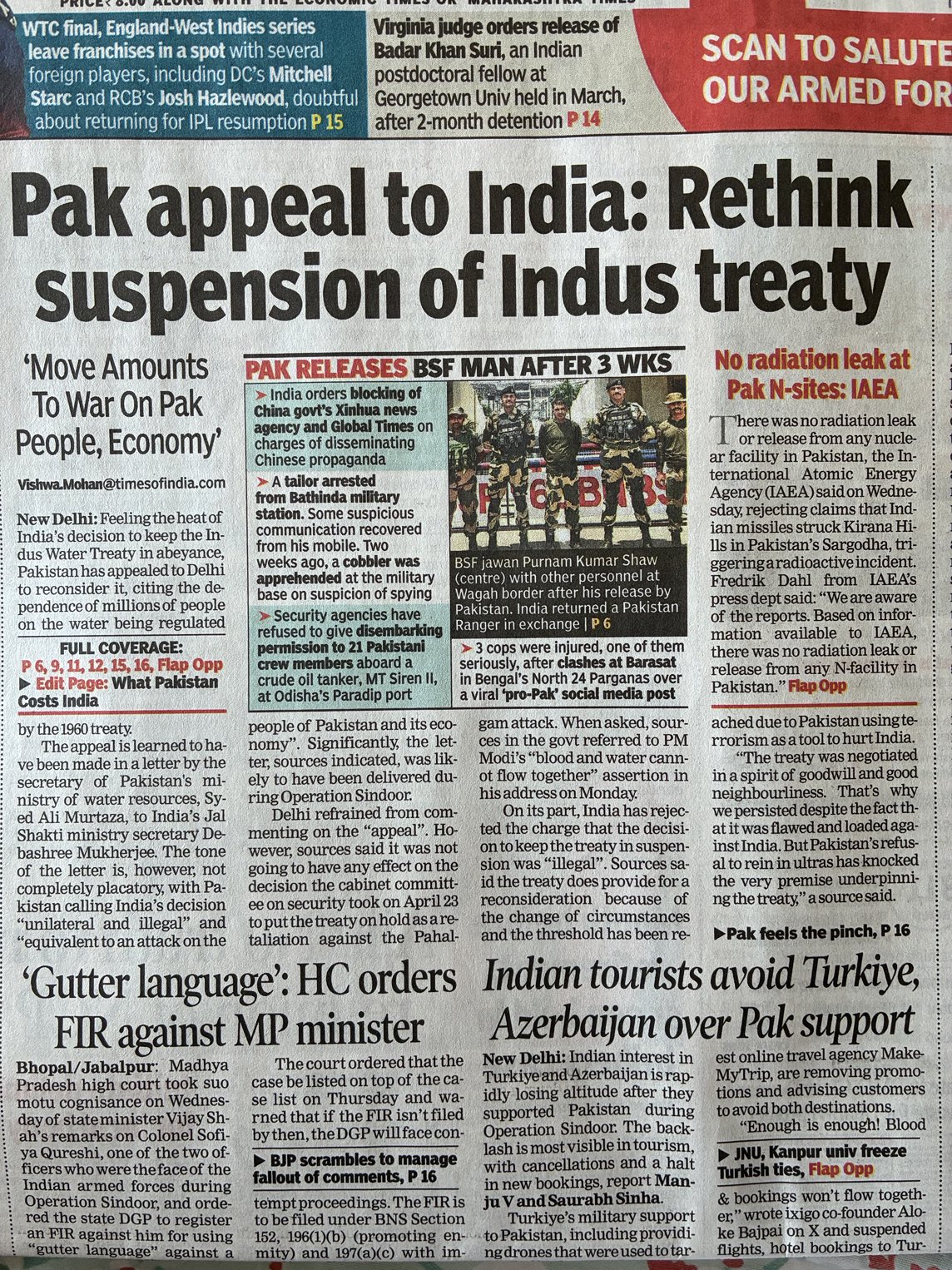
It is India’s biggest sword of Damocles hanging permanently over the head of this terror state.
Keep it there.

-
sanjaykumar
- BRF Oldie
- Posts: 6703
- Joined: 16 Oct 2005 05:51
Re: Indus Water Treaty
Certainly India does not want to see Pakistanis starve.
The IWT disruption will attenuate crop yields. No doubt.
I believe india calibrates its actions and is judicious in its goals.
As demonstrated by Op Sindoor.
Thus India will only cause $8 billion damage to the Pakistan crop yield.
There will be no starvation because India will be ethically bound to sell Pakistan an equivalent amount of grain and other foodstuff.
Coincidentally Pakistan’s defence budget is $8 billion.
They will not have the wherewithal to occupy Baluchistan. India happy Pak happy Baloach happy.
The IWT disruption will attenuate crop yields. No doubt.
I believe india calibrates its actions and is judicious in its goals.
As demonstrated by Op Sindoor.
Thus India will only cause $8 billion damage to the Pakistan crop yield.
There will be no starvation because India will be ethically bound to sell Pakistan an equivalent amount of grain and other foodstuff.
Coincidentally Pakistan’s defence budget is $8 billion.
They will not have the wherewithal to occupy Baluchistan. India happy Pak happy Baloach happy.
Re: Indus Water Treaty
I have been following this subject with interest as the world has several similar situations. the River Nile and River Colorado spring to mind.
The river Nile plays a very similar role in Egypt to the Indus in Pakistan. Similarly, the British were the previous coloniser and left a mess behind. In the case of the Colorado the US has just done what they wished and the last few miles of the river Colorado is just a trickle at the best. As far as I know, there is no US/Mexico treaty on the use of the water of the Colorado and Mexico, fortunately, does not depend on its water. In the case of the River Nile the British left some Egyptian/Sudan/Ethiopian treaty or agreement behind that has held back Sudanese and Ethiopian attempts to use the water of the Blue Nine. Now the Ethiopians have built a dam on the Blue Nile and the Egyptians are threatening action as it threatens the very existence of the country. The much longer White Nile, rises in Uganda (or Burundi if you accept that the source is not Lake Nyanza) just supplies a steady stream but the Blue Nile is responsible for the famous annual floods following rain in the Ethiopian highlands. The Egyptians have the Aswan Dam in Egypt (built circa 1952) that effectively ended the annual floods, thus the GED (Great Ethiopian Dam) will not affect that aspect.
My feeling is that India should look after the interests of her citizens (like the US) and certainly not give any economic help to a unfriendly neighbour that goes to any length to cause it harm. an water that India cannot use may be let through for the Pakis to use but no guarantees or commitments should be entered into. In these days of climate change etc, that seems to be the best way and gives the Indian government the leeway to ensure that the water is best used for it own citizens.
The river Nile plays a very similar role in Egypt to the Indus in Pakistan. Similarly, the British were the previous coloniser and left a mess behind. In the case of the Colorado the US has just done what they wished and the last few miles of the river Colorado is just a trickle at the best. As far as I know, there is no US/Mexico treaty on the use of the water of the Colorado and Mexico, fortunately, does not depend on its water. In the case of the River Nile the British left some Egyptian/Sudan/Ethiopian treaty or agreement behind that has held back Sudanese and Ethiopian attempts to use the water of the Blue Nine. Now the Ethiopians have built a dam on the Blue Nile and the Egyptians are threatening action as it threatens the very existence of the country. The much longer White Nile, rises in Uganda (or Burundi if you accept that the source is not Lake Nyanza) just supplies a steady stream but the Blue Nile is responsible for the famous annual floods following rain in the Ethiopian highlands. The Egyptians have the Aswan Dam in Egypt (built circa 1952) that effectively ended the annual floods, thus the GED (Great Ethiopian Dam) will not affect that aspect.
My feeling is that India should look after the interests of her citizens (like the US) and certainly not give any economic help to a unfriendly neighbour that goes to any length to cause it harm. an water that India cannot use may be let through for the Pakis to use but no guarantees or commitments should be entered into. In these days of climate change etc, that seems to be the best way and gives the Indian government the leeway to ensure that the water is best used for it own citizens.
-
nishant.gupta
- BRFite
- Posts: 149
- Joined: 01 Mar 2019 15:04
Re: Indus Water Treaty
I agree. India should make it clear that any water that terroristan gets will be because India felt like donating some of it.
Boond boond par likha hai peene waale ka naam....and India will decide kisska naam.
Boond boond par likha hai peene waale ka naam....and India will decide kisska naam.
-
sanjaykumar
- BRF Oldie
- Posts: 6703
- Joined: 16 Oct 2005 05:51
Re: Indus Water Treaty
I believe Aswan was built by the Soviets in the late 1960s.
Re: Indus Water Treaty
Omar bats for resumption of Tulbul project for economic push to J&K - New Indian Express
With the Indus Waters Treaty (IWT) kept in abeyance following the Pahalgam terror attack, Jammu and Kashmir Chief Minister Omar Abdullah has called for the resumption of the Tulbul Navigation Project in north Kashmir to boost the region’s economy.
The project was halted in 1987 due to pressure from Pakistan, which cited various clauses of the IWT that restrict any storage along the Jhelum river, a part of the Indus basin.
Notably, Articles III and IV of the IWT grant India the rights to use the waters of the Indus river basin for non-consumptive purposes. The Tulbul Navigation Project, also known as the Wular Barrage Project, was initiated in the 1980s with the goal of ensuring year-round navigation that would connect three districts of Kashmir — Anantnag, Srinagar, and Baramulla — and generating electricity downstream, particularly during the winter months.
Abdullah has posted a 30-second video clip on social media platform X (formerly twitter) where it shows Wular lake and suspended civil work of the Tulbul Navigation Barrage.
“It (Tulbul project) was started in the early 1980s but had to be abandoned under pressure from Pakistan citing the Indus Waters Treaty,” writes Abdullah.
“Now that the IWT has been ‘temporarily suspended’, I wonder if we will be able to resume the project. It will give us the advantage of allowing us to use the Jhelum for navigation. It will also improve the power generation of downstream power projects, especially in winter,” he adds.
The project intends to regulate water release from Wular Lake to a minimum depth (1.4 metre) in the Jhelum River during lean winter months. India has been consistently raising the completion of the navigation project with Pakistan in secretary-level composite dialogues and side talks at multilateral platforms.
The last time India spoke with Pakistan was in 2014. Then water resource minister Ghulam Nabi Azad told Parliament about ongoing discussion with Pakistan and refused to give time frame for resumption of the work.
According to Pakistan’s perception, the project structure constitutes barrage with a storage capacity of around 0.3 million acre feet (0.369 billion cubic metre) and that India is not permitted to construct any storage facility on the main stem of the river Jhelum. Indian side has pointed out that the structure is not a storage facility but a navigation facility as defined in the Indus Waters Treaty.
Re: Indus Water Treaty
Omar, Mehbooba spar over Tulbul navigation issue
As a first step, India should greenlight and accelerate all those projects which are compliant with IWT according to our commissioner. Pakistan has been regularly objecting to any project on the indus system, introducing delays and asking for design changes that reduce lifetime and economic viability of the projects. This has to stop.
Not sure who Mehbooba is trying to please.A war of words broke out on Friday (May 16, 2025) between Jammu and Kashmir Chief Minister Omar Abdullah and PDP president Mehbooba Mufti over the former's call to revive the Tulbul Navigation Barrage project on Wullar Lake in view of the suspension of the Indus Waters Treaty (IWT).
While Ms. Mufti termed Mr. Abdullah's remarks as "irresponsible" and "dangerously provocative", the chief minister hit back saying she refuses to acknowledge that the IWT was a "historic betrayal" with the people of J&K because of her "blind lust" to score "cheap" publicity points, and please some people across the border.
As a first step, India should greenlight and accelerate all those projects which are compliant with IWT according to our commissioner. Pakistan has been regularly objecting to any project on the indus system, introducing delays and asking for design changes that reduce lifetime and economic viability of the projects. This has to stop.
Re: Indus Water Treaty
Anujan wrote: ↑16 May 2025 20:54 Omar, Mehbooba spar over Tulbul navigation issue
Not sure who Mehbooba is trying to please.A war of words broke out on Friday (May 16, 2025) between Jammu and Kashmir Chief Minister Omar Abdullah and PDP president Mehbooba Mufti over the former's call to revive the Tulbul Navigation Barrage project on Wullar Lake in view of the suspension of the Indus Waters Treaty (IWT).
While Ms. Mufti termed Mr. Abdullah's remarks as "irresponsible" and "dangerously provocative", the chief minister hit back saying she refuses to acknowledge that the IWT was a "historic betrayal" with the people of J&K because of her "blind lust" to score "cheap" publicity points, and please some people across the border.
As a first step, India should greenlight and accelerate all those projects which are compliant with IWT according to our commissioner. Pakistan has been regularly objecting to any project on the indus system, introducing delays and asking for design changes that reduce lifetime and economic viability of the projects. This has to stop.
Anujan ji,
Mehbooba is not only anti Indian, but she and her khattarpanthi family are also as pro jihadi as they come
her funds are running low as the chances to pilfer have not come her way, especially, after art 370 removal.
traditionally, these openly thieving cashmeri political families have always been feeding off the public trough for tens of decades and the paki ISI has always played a big part in their daily lives and livelihoods, even today. But the scale of support has come down because the center has been targeting jihadi financing and illegal hawala transfers
Re: Indus Water Treaty
Excellent! A political issue in Kashmir where the Kashmiri interests are clearly opposed to Pakistani interests is a great touchstone.
Re: Indus Water Treaty
India clearly believes that tulbul navigation project is allowed under para 7 and para 9 of annexure E of IWT. It clearly states that waters of Jhelum main can be stored in lakes, and used for non-consumptive purposes.
Pakistan's strategy so far was not to look at whether projects are compliant. Instead they oppose any project that can theoretically be used for diverting water. In addition their objections are aimed at increasing the costs of these projects, delaying them or reducing their lifespans.
I am not sure what Mehbooba Muft means by "provocative" despite the awam, news anchors, politicians , jernails and jihadis of Pakistan claiming that India cuts of water from the indus river system, their own commissioner is on record stating in their parliament that India has meticulously followed the treaty.
Wullar barrage preceeds the abeyance of IWT. it was India's assessment that it was compliant with IWT. what is provocative about pursuing it? I'm not even sure why Mehbooba Mufti (jihadis pasand whatever) can even talk like this, serving her masters outside the borders while harming interests of her constituency.
Pakistan's strategy so far was not to look at whether projects are compliant. Instead they oppose any project that can theoretically be used for diverting water. In addition their objections are aimed at increasing the costs of these projects, delaying them or reducing their lifespans.
I am not sure what Mehbooba Muft means by "provocative" despite the awam, news anchors, politicians , jernails and jihadis of Pakistan claiming that India cuts of water from the indus river system, their own commissioner is on record stating in their parliament that India has meticulously followed the treaty.
Wullar barrage preceeds the abeyance of IWT. it was India's assessment that it was compliant with IWT. what is provocative about pursuing it? I'm not even sure why Mehbooba Mufti (jihadis pasand whatever) can even talk like this, serving her masters outside the borders while harming interests of her constituency.
Re: Indus Water Treaty
India has started work on expanding the existing canal network in Jammu like the Ranbir canal that can take away water to Punjab.
https://www.hindustantimes.com/india-ne ... 64080.html
https://www.etvbharat.com/en/!bharat/ch ... 5051606831
https://www.hindustantimes.com/india-ne ... 64080.html
https://www.etvbharat.com/en/!bharat/ch ... 5051606831
Re: Indus Water Treaty
In general, most treaties are intended to prevent/lower the risk of conflicts between two states that would have significant "lose-lose" outcomes.
In my opinion the IWT treaty was signed because:
- At the time, Bharat and Paastan were not that much different in military capability
- Banditji wanted to be seen as a magnanimous statesman
Neither condition exists now, so we can legitimately suspend/abandon our adherence to the IWT. Of course, there is a still a risk for aggression from Paastan over the IWT suspension, but we are now well confident of avoiding a "lose-lose" outcome as the short sharp war from May 7-10 has shown.
Re: Indus Water Treaty
From the Indian perspective, one can say that IWT failed spectacularly, since it did not prevent the Sino-Pak boundary agreement of 1963, the 1965, 1999 wars or any number of terrorist attacks thereafter.
